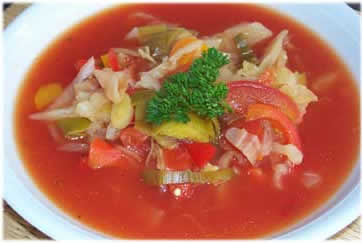
Cabbage Soup Diet for Heart Patients
This article takes a look at the cabbage soup diet, a hospital-created eating regimen designed to help heart patients to lose weight quickly in preparation for heart surgery.
The story goes that the diet was designed by hospital staff to help cardiac patients lose weight fast.
This was necessary to prepare them for surgery as it was considered potentially dangerous to be overweight when having anaesthetic.
The diet has been referred to by many hospitals under other names, but the basic premise is the same.
No medical center, however, endorses it for long term weight loss, according to a report in the The New York Times (see references below).
Its main component is an extremely low-calorie vegetable soup with cabbage and other "zero-calorie" vegetables as the main ingredients. This is eventually supplemented with a limited selection of other foods.
 It's intended to trigger substantial (10 to 17 pounds) of weight loss in just one week.
It's intended to trigger substantial (10 to 17 pounds) of weight loss in just one week.
However, it is not considered safe to adhere to the diet in excess of a week.
Cabbage Soup Diet Composition
Although numerous variations of the soup have been touted over time, the basic recipe calls for a handful of different vegetables (the chief one being cabbage), to which other ingredients are added over several days.
The dieter can eat as much soup as desired and can add fruits and vegetables during the first three days. Beef is added on the fifth day, and brown rice and fruit juice appear on the seventh day. (See the first link in the References section for a specific list of ingredients and cooking instructions.)
Nutritional Limitations
Don't plan on maintaining this regimen for more than a week because the soup itself is extremely low in calories and nutrients.
Following it for more than seven days can lead to serious malnutrition. This program seems to be the polar opposite of a high fat program like the Atkins diet, but its very short duration and return to a normal menu makes up for its shortcomings in some measure.
In The New York Times article, dietitian Paula Posner criticized the diet, saying, "...there's no balance. Not enough protein on a regular daily basis and it doesn't change your habits."
Accepting the diet as an only short-term weight-loss approach may not be hard for many people to accept, in any case. The American Heart Association, which disapproves of the diet, points out that severely food-restricting diets "are so monotonous...that it's almost impossible to stay on them for long periods."
People with diabetes or other dietary requirements should consult a doctor before embarking on this eating plan, The American Heart Association warns (see references below). The soup's high salt content also may make it unsuitable for people with high blood pressure.
Results
If followed faithfully, this very-low-calorie program will cause loss of 10 or more pounds during the week you're on it, but much of this represents loss of water and muscle, not fat.
Also, that rate of weight loss isn't sustainable because very-low-calorie diets cause the body to go into "starvation mode." To conserve calories, it slows the metabolism and begins storing the calories as fat, rather than burning them for energy.
Because the diet doesn't teach dieters how to eat right over the long term, as people resume a more normal food plan, they quickly regain the pounds they lost, a loseweight.intervalinc.com article says (see references below).
References
Melt Pounds With Cabbage Soup, a Diet From Nowhere Says; Monique P. Yazigi; March 20, 1996
American Heart Association: Quick-Weight-Loss or Fad Diets
Lose Weight with the Cabbage Soup Diet
Note: Zero calorie vegetables include those that cause the body to burn as many calories to digest as they actually contain, creating a net-zero calorie effect.
Posted on September 8, 2022
(Top of Page)
- Copyright © dietreviews.pages.dev All rights reserved
- Privacy
- Site Map